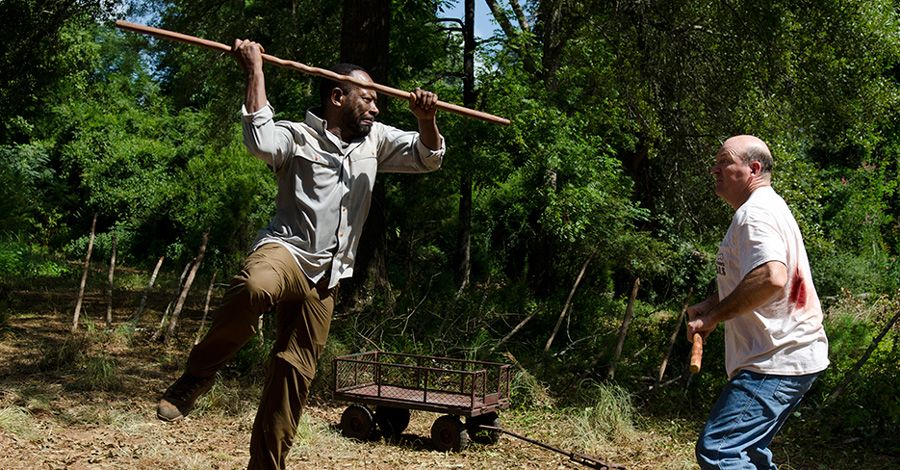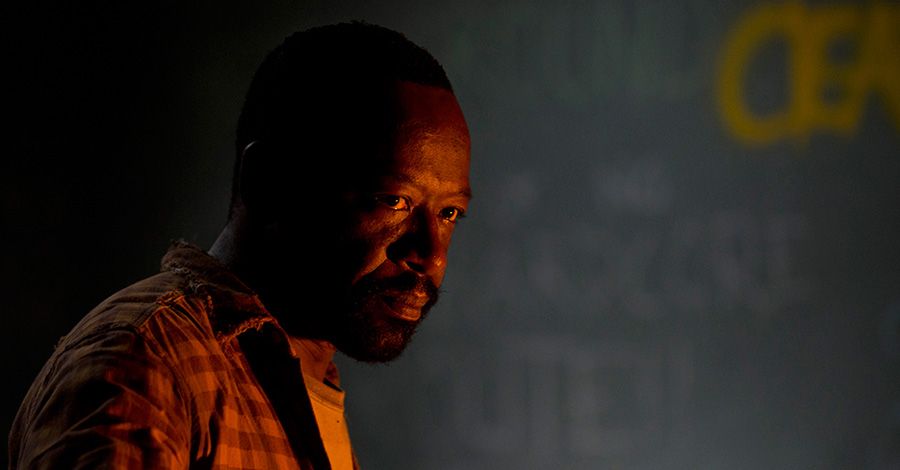Seeing as "Here's Not Here" is the only non-premiere/finale episode to ever get the 90-minute treatment on "The Walking Dead," you'd think it would be loaded with plot and extravagant action sequences. Nope. Instead, director Stephen Williams and writer/showrunner Scott Gimple give us a quiet two-man play about how Morgan crawled his way out of the insanity he was experiencing back in Season 3's "Clear" and into the Zen-like warrior state he is today.
Only he didn't exactly crawl-he was lifted out by a former forensics psychiatrist named Eastman (John Carroll Lynch). Morgan stumbles across the man's isolated, well-kept cabin in the woods while still in his vengeful frenzy that involves culling any human or walker he comes into contact with. When he tries to steal Eastman's goat (honored with the lovable name of Tabitha) and take over the property for himself, Eastman gets the upper hand thanks to a combination of quick psychology and forceful jÅ staff moves.
Of course, it's not Eastman's belongings that Morgan actually seeks, but a swift death to finally end his pain. Ironically, Eastman's the last person in the post-apocalyptic world who would give him such a thing, as he's a pacifist who's come to value all non-walker life-hence the goat that, under anyone else's care, would surely be slaughtered. He's also savvy enough to realize that if Morgan truly wanted to die, he would have done so by his own hand quite some time ago. In other words, there's still some humanity within him that's worth saving. The episode then focuses almost exclusively on Eastman's efforts to bring Morgan around to his way of thinking.
That's a huge risk for a show whose current season has gotten its most compelling mileage-and character development-not out of dialogue, but white-knuckle zombie action. The gamble pays off nicely, for the most part. For one, it's invigorating to see conversation centered around what's good in the world rather than ominous platitudes about what's not. It also helps that Lennie James and Lynch deliver such conflicted performances, visually carrying grief on their faces even as the former starts to accept the peace-over-violence Aikido teachings of the latter. Self-improvement aside, neither man forgets his considerable loss--Morgan in seeing his wife and son turned into walkers and Eastman losing his entire family to what's perhaps a more horrific fate: one of the inmates at his prison broke out just so he could murder the psychiatrist's wife and daughter.
Many of these plot details unfold methodically over the bulk of the episode, and that's the other great strength of "Here's Not Here": making Morgan's transformation a slow (and thus a more believable) one. While his change often relies on the benchmarks of many a cinematic training montage--complete with steadily improving martial arts, contemplative strolls through nature, and Yoda-esque pearls of wisdom from Eastman--the snail's pace, along with performances that never forget the characters' grief, keep the story from feeling like one long 90-minute cliche.
But what makes for good storytelling doesn't always make for a positive outcome for a character, and Eastman ends up paying for Morgan's reclaimed morality. When Morgan encounters the reanimated corpse of a man he murdered in cold blood earlier on, he hesitates to kill him a second time, partly out of remorse and partly because a small, rotten part of him may still want someone--human or undead--to end his life. It's the inverse of the buried hope Eastman originally saw in him. The mentor steps in to dispatch the walker, and as a result, gets bitten.
Where someone with a more negative outlook on life (or even a pre-apocalypse Eastman, as we soon discover) would view the event as a tragedy, Eastman sees it as a victory. Every day that Morgan's perspective becomes more balanced is a victory. Every day that he chooses to stay alive is a victory. Every day that he decides not to kill is a victory, even if all these things come at the expense of Eastman's (and his goat's!) life. That's because he's been consumed with darkness and knows how hard it is to break free of it, having previously used Morgan's cage to lock up his family's killer and watch him starve to death over 47 days. In a way, this ruthless revenge did end up bettering Eastman, just not in the way he expected. As he tells Morgan, the act of revenge nearly broke him, prompting him to swear never to kill again and sending him on his current path to peace. It's one of the last things he tells Morgan, his final gift to the man he saved in more ways than one.
Although the episode gets all the relationship business between Eastman and Morgan right, there are still some moments of heavy-handedness. For instance, Gimple overcompensates in showing us Morgan's madness early on, relying on a warped lens effect to drive home just how crazy he's gotten instead of just letting James' hefty performance do the work. And on an unrelated note (but one that bears mentioning nonetheless), it's a troll move to prolong the confirmation or fake-out of Glenn's death after a week of coy interviews from the show's writers. At this point, I think it's safe to say that it's a fake-out (or, more accurately, a copout).
Still, "Here's Not Here" ends up being that rare "Walking Dead" episode that's rooted in redemption. Even at the end, where Morgan spares the life of the Wolf he appeared to have killed two episodes ago, I'm left commending his decision when I should be bemoaning it. Is it a safe move on his part? Absolutely not. As the Wolf tells him, if he escapes the holding cell Morgan's placed him in, he won't hesitate to kill every last soul in Alexandria. But Morgan's not an idiot either. In a recent interview with Entertainment Weekly, James drove home the point that Morgan's not yet at Eastman's level of wisdom, nor is the Wolf at his. Eastman was confident enough in his teachings and Morgan's moral fiber, damaged as it had become, to leave the prison door unlocked. But Morgan does the opposite for the Wolf, showing an awareness that things could easily go south. Just look at what happened to Glenn's reformation of Nicholas. Not everyone's strong enough to follow through on a second chance.
Also, say the Wolf does escape for the sole purpose of wreaking havoc on Alexandria, much like the convict who killed Eastman's family. Would Morgan then view his efforts as a waste? Eastman made it very clear that he wishes he hadn't tortured Creighton Dallas Wilton, despite all the harm he caused. In his eyes, human beings simply aren't meant to kill. As he's discovered from his prison work, even the worst of them (outside of the truly evil Wilton) have a hard time coming to terms with it when they do.
I expect Morgan, while bemoaning any death brought upon by the Wolf, would feel the same way. Just look at the observation he makes about Tabitha earlier on. After she escapes and gets eaten by walkers, Eastman compares her to Morgan, as they both had learned how to get out of their holding pens. Morgan corrects him: "I didn't figure it out. You had to tell me." He sees Tabitha as more intelligent than him, at least in that single instance. He sees Tabitha as being on his level. I'm sure he sees the Wolf in a similar light, no matter how rabid, murderous, and perhaps evil as he is. Will Rick, who we hear returning to Alexandria's gates right before the credits, agree with Morgan? I suspect not.



